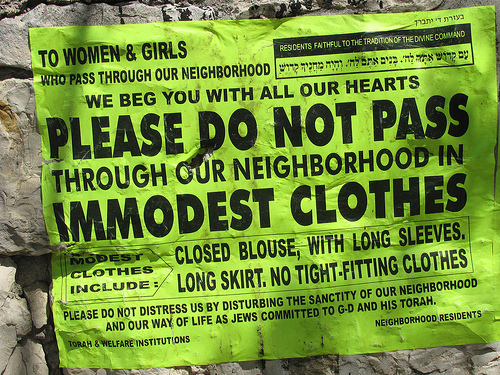Tag : Tara Bognar
April 24, 2013 by Tara Bognar
To Whom Does a Child Belong?
 When a Jewish child is adopted and raised by non-Jews and not brought up to observe Judaism, traditional Jewish law calls him or her a “kidnapped child” (תינוק שנשבה). Still considered Jewish, they have been torn from their people and are raised without the knowledge of how to be a Jew, and thus cannot be held responsible for their transgressions of Jewish law. (This concept has been applied by some also to Jewish children raised by Jews who do not practice or teach them ‘proper Judaism’, as defined by those applying the term.) Historically, captive children were sometimes torn from their communities without their parents’ consent, but not always. Many of the Shoah’s “hidden children,” for example, were raised by non-Jews, sometimes without even the knowledge that they had been Jewish. Their lives were saved and that is a blessing, but from a traditional communal perspective, there is also tragedy. Some Orthodox Rabbis still prohibit Jewish women from donating an egg to a non-Jewish woman or acting as a surrogate for a non-Jewish woman, out of concern that this might lead to a Jewish child being raised as a non-Jew.1
When a Jewish child is adopted and raised by non-Jews and not brought up to observe Judaism, traditional Jewish law calls him or her a “kidnapped child” (תינוק שנשבה). Still considered Jewish, they have been torn from their people and are raised without the knowledge of how to be a Jew, and thus cannot be held responsible for their transgressions of Jewish law. (This concept has been applied by some also to Jewish children raised by Jews who do not practice or teach them ‘proper Judaism’, as defined by those applying the term.) Historically, captive children were sometimes torn from their communities without their parents’ consent, but not always. Many of the Shoah’s “hidden children,” for example, were raised by non-Jews, sometimes without even the knowledge that they had been Jewish. Their lives were saved and that is a blessing, but from a traditional communal perspective, there is also tragedy. Some Orthodox Rabbis still prohibit Jewish women from donating an egg to a non-Jewish woman or acting as a surrogate for a non-Jewish woman, out of concern that this might lead to a Jewish child being raised as a non-Jew.1
In not so distant American history, Native American children were taken from their communities in such numbers (25-35% of Native children2) that leaders, already struggling with the after-effects of centuries of broken promises, exploitation, oppression, and multigenerational poverty, feared for the future of their community and their children. Rather than supporting Native American communities to provide for and protect their children, predominantly white government representatives ‘saved’ native American infants and gave them into the hands of outsiders.
- 1 Comment
March 4, 2013 by Tara Bognar
Are Adoptive Families Culturally Persecuted?

Dr. Debora Spar
On Friday I attended a daylong symposium about adoption. The keynote speaker was Dr. Debora Spar, President of Barnard College. The topic of her address was “Adoption and its Critics.”
Her speech floored me. I had not realized that adoptive families felt culturally persecuted.
She presented two main theories for why people oppose, or are uncomfortable with, adoption. The first was the cultural meme that adoptive parents are bad people, which she traced back to the stigma against barren women, historical myths of stolen children and changelings, the fact that adoption often involves more overt exchanges of money than does family formation by birth, and evolutionary anthropological ideas that people shouldn’t be inclined to invest heavily except in their own flesh and blood. She also pointed out that you can barely find a story of an adoptive family where the adoptive parents are not awful, using orphaned Harry Potter as a prime example.
The second was the cultural meme that adopted children are bad people, which she traced back to cultural misgivings about genetic unknowns, the human tendency to assume that their own genes wouldn’t be a problem but that foreign genes might be, and to the media’s handling of adoption, especially the disproportional amplification of ‘bad stories,’ and still probably poorly understood concerns about attachment disorder and identity development.
- 3 Comments
February 13, 2013 by Tara Bognar
Sisters in Law
February’s ABA Journal ran an excellent article by Kristin Choo about Muslim women practicing law in the United States and abroad.
These women are looking to their interpretations of Islamic scripture and tradition to fight inside and outside: inside to justify their work to Muslims who do not agree that women should have a voice in the legal tradition, and outside to be taken seriously by a mainstream culture that makes many harmful assumptions about Muslims and especially Muslim women’s roles.
Azizah al-Hibri (who wrote “My Muslim Ancestor Hagar” for Lilith in 1997) is a law professor who founded Karamah: Muslim Women Lawyers for Human Rights. “The chief mission of Karamah is to develop new Islamic jurisprudence from a women’s and human rights perspective, looking with fresh eyes at Islamic religious texts and traditions, re-examining passages and translations, and researching the historical context in which they originated to uncover a faith stripped of patriarchy…the development of new Islamic jurisprudence and the development of a network of jurists trained to apply these new ideas.”
As a Jewish lawyer, feminist, and student of Jewish law, I found this article and the spirit conveyed fascinating and exciting. I wonder whether the idea of developing a new Islamic jurisprudence feels as tremendously ambitious to al-Hibri as the idea of a new Jewish jurisprudence sounds to me. I do not know enough about Muslim law to know whether the idea itself is as groundbreaking and potentially destabilizing in Islam as it promises to be in Judaism, but I am inspired.
- 1 Comment
April 5, 2012 by Tara Bognar
A.M. New York: Highlights for Lilith Readers
I happened on th is free city rag on the subway this morning and was impressed by all the items I thought might be of interest to my fellow Lilith fans and thought I’d share the wealth. Unfortunately, none of my favorites are actually on their website so I’m providing other links where they were available:
is free city rag on the subway this morning and was impressed by all the items I thought might be of interest to my fellow Lilith fans and thought I’d share the wealth. Unfortunately, none of my favorites are actually on their website so I’m providing other links where they were available:
NYPD “Hercules” teams are guarding synagogues during Passover in response to a newly posted threatening Al Qaida mock movie poster.
Seriously – you don’t often come across this much exciting cross cultural material in a three sentence article. Al Qaida, a fundamentalist Muslim terrorist group that, among other things, would like to purify Islam of outside influences, has prepared an impressively designed poster that could easily be blazoned across a bus to promote a new Hollywood film if it weren’t for the (surely unintentional) sexual double entendre: “Al Quaeda: Coming Soon Again in New York.”
“Hercules,” of course, was an ancient Greek demi-god known for his strength. Some ancient Jews embraced Hellenism (apparently one scribe claimed that two sons of Abraham joined Hercules on his Africa expedition) and others strenuously resisted it, culminating in a bloody civil war – see Hannukah. The cultural resonances of American “Hercules” teams guarding Jewish synagogues during the holiday when we commemorate escaping from Egypt to become a sovereign people in our own land are wonderful to ponder. (Incidentally, the planes used by the IDF in the Entebbe raid were also called Hercules).
- No Comments
March 8, 2012 by Tara Bognar
International Women’s Day, Iranian Women’s Rights
 This morning I attended a panel discussion about the status of the struggle for women’s rights in Iran. Sponsored by the organization Iran 180 and scheduled in honor of International Women’s Day, the panel included Roya Hakakian, a writer, poet, and producer based in New York, Solmaz Sharif, a dissident journalist and poet, and Arash Abadpour, a (male) computer scientist and popular Persian and English language blogger.
This morning I attended a panel discussion about the status of the struggle for women’s rights in Iran. Sponsored by the organization Iran 180 and scheduled in honor of International Women’s Day, the panel included Roya Hakakian, a writer, poet, and producer based in New York, Solmaz Sharif, a dissident journalist and poet, and Arash Abadpour, a (male) computer scientist and popular Persian and English language blogger.
Iran is an important topic in Jewish news media, even more so recently, with speculation about its development of nuclear capabilities and discussion of appropriate American and Israeli responses. But spending Purim morning thinking specifically about the status of women in Esther and Vashti’s ancient home seemed appropriate. The panel’s moderator, New York Times reporter Anne Barnard, successfully guided discussion towards intra-Iran human rights issues but unfortunately had less success keeping the focus on women.
Beyond an acknowledgment of the courage of women dissidents in Iran in general and specific recognition of Nazanin Khosravani who just two days ago began a six year prison sentence after refusing to write a letter admitting fault and requesting pardon for “collusion” and “propaganda” against the regime, the panelists’ discussion was quite general and non-gender specific.
From a Jewish perspective (and an International Women’s Day perspective) that is too bad. The struggle of women in the juxtaposition of extremist theocratic suppression of women’s rights, everyday sexism, and a fairly liberal and educated, but struggling, middle class could prove all too relevant to those concerned about the situation in Israel.
- 4 Comments
February 10, 2012 by Tara Bognar
State Funding and Fertility Treatments–In an Israeli Prison

http://www.flickr.com/wesbrowning
How seriously do we take reproductive rights and freedoms?
Israeli Prison Services (IPS) just agreed to fund fertility treatments for two convicted murderers who met and married while incarcerated. The two have the right to conjugal visits and their freedom to procreate is not restricted, but unlike other Israelis, they would not normally be entitled to state funding for fertility treatment. They were prepared to argue, in front of an administrative court, that that restriction violates their right to have children.
Equal access to reproductive freedom is a right long fought for by feminists. Still, reproductive freedom has meant different things to women in different social, economic, and cultural positions. In the United States, poor women, women of color, and women with physical and mental disabilities have fought against forced sterilization and even forced abortion, while other women must fight for access to voluntary contraception, sterilization, and abortions.
The idea that the state should actively decide who may have children touches on core issues of personal autonomy and bodily integrity. In the United States, even people who are convicted of abusing or murdering their children are not legally prevented from having other children.
If everyone else in Israel has the right to state funding for fertility treatments, can it be just, legal, or moral to deny that right to someone just because they are incarcerated? What if their life sentences mean that any children would inevitably become the wards either of the state or another family member? (According to current law, the child may be raised by their mother in prison until two years of age).
Because IPS voluntarily granted funding, no Israeli court had to make that decision.
- No Comments
February 1, 2012 by Tara Bognar
Modesty and Desire

http://www.flickr.com/center_for_jewish_history
Rabbi Dov Linzer, a prominent figure in Open Orthodoxy, recently published Lechery, Immodesty and the Talmud in the New York Times. The article explicitly responds to some recent attempts by ultra-Orthodox leaders in Israel to enforce their standards of “modesty,” (E.g.: Segregated elevators; segregated buses; a newspaper blurring out the mother’s face in the family picture accompanying the article about the murder of the mother and father). Linzer rebukes the ultra-Orthodox for hyper-sexualizing women and calling it “modesty” to police their dress and public presence. He cites Talmudic sources to correct the ultra-Orthodox understanding of Jewish law in this area. Linzer says:
The Talmud tells the religious man, in effect: If you have a problem, you deal with it. It is the male gaze — the way men look at women — that needs to be desexualized, not women in public. The power to make sure men don’t see women as objects of sexual gratification lies within men’s — and only men’s — control.
He concludes:
Jewish tradition teaches men and women alike that they should be modest in their dress. But modesty is not defined by, or even primarily about, how much of one’s body is covered. It is about comportment and behavior. It is about recognizing that one need not be the center of attention. It is about embodying the prophet Micah’s call for modesty: learning “to walk humbly with your God.”
- 7 Comments
January 23, 2012 by Tara Bognar
Muslim and Jewish Marriage Contracts in American Courts
 As someone whose interest in secular law grew out of my studies of Jewish law, I’ve always been especially fascinated by the ways in which the two systems of law interact. A recently published article, “How To Judge Shari’a Contracts: A Guide To Islamic Marriage Agreements In American Courts,” got me thinking about some of the parallels and common experiences between Jews and Muslims in interacting with secular American courts.
As someone whose interest in secular law grew out of my studies of Jewish law, I’ve always been especially fascinated by the ways in which the two systems of law interact. A recently published article, “How To Judge Shari’a Contracts: A Guide To Islamic Marriage Agreements In American Courts,” got me thinking about some of the parallels and common experiences between Jews and Muslims in interacting with secular American courts.
Some Jewish Examples
Last month I was reading a case (Tsirlin V. Tsirlin, 2008) about an Israeli Jewish couple living in New York. The wife asked the husband for a get, the Jewish bill of divorce, and he gave her one in front of a Brooklyn Beit Din (Jewish court). The husband’s father brought the get to an Israeli court, on the strength of which the Israeli court issued a decree of divorce for the couple. Shortly afterward, the husband later filed for divorce in New York, also seeking orders for custody/visitation and child support. The wife moved to dismiss the action for divorce on the grounds that the New York courts should recognize the Israeli divorce. Judge Jeffrey Sunshine ruled that:
“If this court were to sanction the utilization of a ‘Get’ to circumvent the constitutional requirement that only the Supreme Court can grant a civil divorce, then a party who obtains a ‘Get’ in New York could register it in a foreign jurisdiction and potentially, later on, rely on the ‘Get’ to obtain a civil divorce in New York thereby rendering New York State’s Constitutional scheme as to a civil divorce ineffectual… It would have the practical affect [sic] of amending the Domestic Relations Law section 170 to provide a new grounds for divorce.”
- 1 Comment
November 17, 2011 by Tara Bognar
Gangs of Meah She’arim

http://www.flickr.com/38440152@N06
Last week, a Meah She’arim gang that calls itself the Sikrikim assaulted a small group of Haredi girls, yelling and spitting at them for not being quite modestly dressed enough. (Helpfully, Yeshiva World lets us know that the “females” were appropriately dressed and thus, “the attack was without provocation and without justification.”)
A couple of hours later, relatives of the girls returned to the scene and beat up the young men responsible for the harassment. It turned into a brawl involving dozens of people.
Earlier this year, at the end of Sukkot, the Sikrikim glued shut the door of Gerrer Rebbe David Alter to prevent him from leaving the house for services. In retaliation, a group of Gerrer Hasidim boys and men chased down a Sikrikim leader and beat him bloody.
The Sikrikim named themselves after the Sicarii, an ancient Jewish guerilla organization that sought Jewish independence from the Romans and service to God alone, mostly by committing violence against fellow Jews that it perceived as collaborators. The media coverage I’ve seen (mainly English language orthodox and ultra-orthodox blogs), describes the modern-day Sikrikim as an independent group of somewhere between 20-100 young men.
- 1 Comment
November 8, 2011 by Tara Bognar
Enough with stereotypes
 The media coverage and commentary immediately following Sam Friedlander’s murder of his wife Amy and their two children included a disturbing level of victim-blaming:
The media coverage and commentary immediately following Sam Friedlander’s murder of his wife Amy and their two children included a disturbing level of victim-blaming:
Michael Borg: “I have heard from him the abuse she put him through in terms of belittling and emasculating him in front of the kids and in front of friends.”
David Pine: “He looked like an emotionally beaten man… I can’t put a handle on why he would take the lives of his kids, but whatever it was was a result of years of emotional torment that he must have (gone) through in that household.”
A childhood acquaintance asked on his blog: “Did his wife’s remarks bring him back to a time when he really was a small person?
The problem of victim-blaming is sadly widespread, and three different local groups, Hope’s Door, My Sister’s Place and the Westchester Hispanic Coalition staged a rally to raise awareness of the issue.
But I think that the language used here points to a specifically Jewish problem. It strongly evokes certain stereotypes about Jewish women and men: the domineering, emasculating Jewish woman, and the meek, dominated Jewish man. Whoever Sam and Amy really were and however their relationship played out, these stock characters help mask the absurdity of the implication that Amy Friedlander was or even could have been morally responsible for her husband’s murderous actions.
- No Comments
 Please wait...
Please wait...
